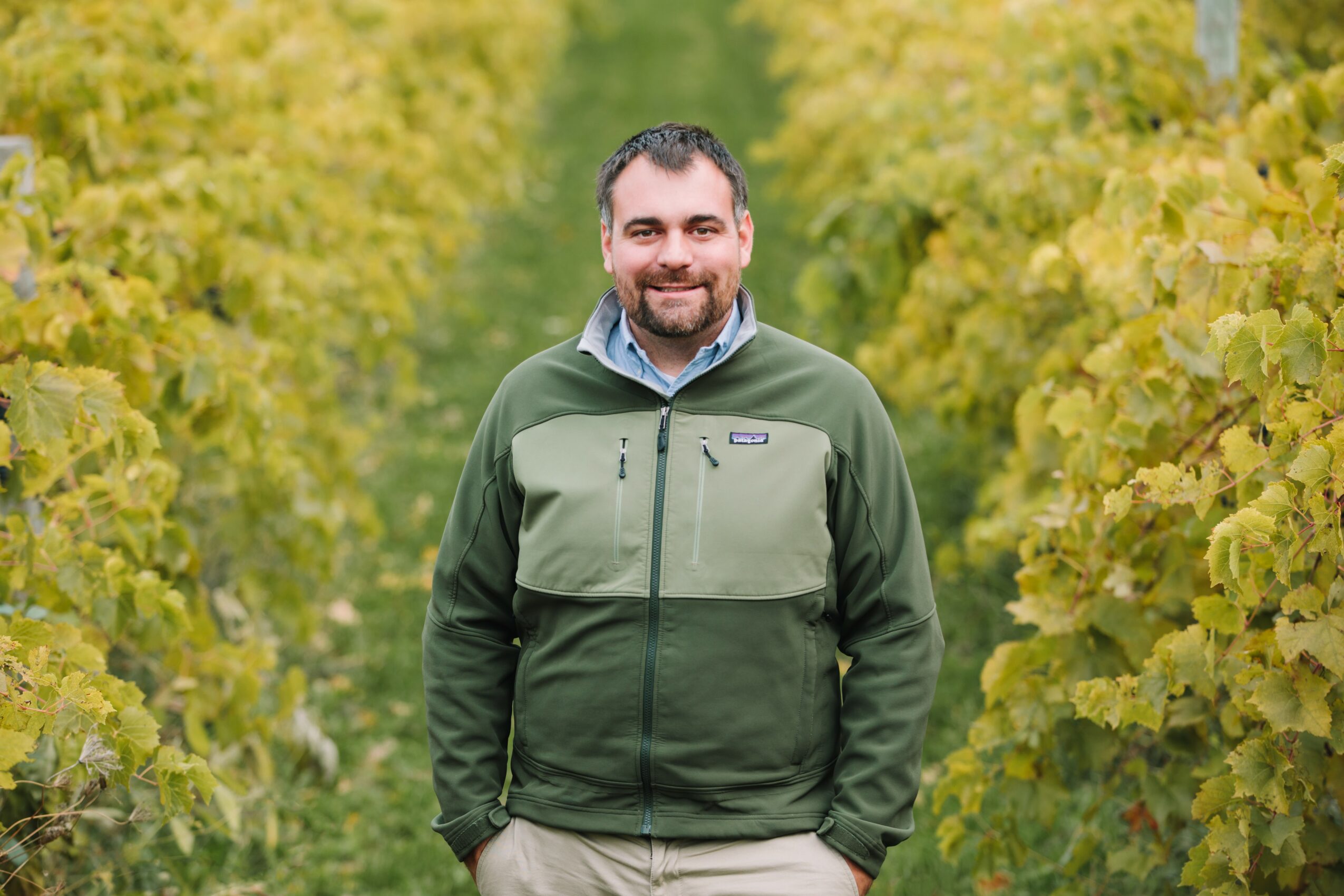

Today we’d like to introduce you to Sam Simpson.
Hi Sam, so excited to have you with us today. What can you tell us about your story?
I grew up in a multigenerational farming family in Leelanau County, where agriculture wasn’t just something we did—it shaped the rhythm of our lives. My earliest memories are of long days in the orchards, working alongside my parents and learning that the land rewards consistency, patience, and a lot of grit. I didn’t know it then, but those lessons would become the backbone of how I approach business and leadership today.
I went to college and earned a degree in finance, thinking I’d build a career in a completely different direction. But after our dad passed away, everything shifted. My sister Taylor and I found ourselves making a decision neither of us had planned for: whether to return home and take responsibility for our family’s cherry farm and winery. At the time, Taylor was living in Chicago and building a career in fine wine sales, and I was just beginning my own professional path. To come back meant uprooting everything. But it also meant honoring what our family had built and stepping into an opportunity to shape its future.
We moved home in 2009 and inherited a small but spirited operation—about 32 acres of vineyard, mostly hybrids, and a regional footprint. From the beginning, we agreed on one thing: if we were going to do this, we were going to do it right. Every decision would be rooted in quality, longevity, and a belief in what Michigan wine could become.
Over the years, that focus has guided us as we’ve grown into farming just under 300 acres of premium vinifera grapes and expanded our brands to reach customers around the country. But the growth itself isn’t what we’re most proud of—it’s how we’ve approached it. Taylor and I are both people-focused and passionate about expanding the market for Michigan wine. We’ve worked to make sure we’re representing our state from the front, not as an emerging region trying to catch up, but as a true producer of world-class wines grown right here. Our goal has always been to show what’s possible from Michigan vineyards and to compete on an international level, not just a regional one.
Our strengths complement each other in that shared mission. Taylor has an incredible sense for connecting with people, storytelling, and bringing our brands to life, while I focus on long-term planning, operations, and the systems that support sustainable growth. But at the core, we’re driven by the same thing: a commitment to elevating our industry and creating something that lasts.
Coming home wasn’t in the original plan, but it’s become the most meaningful chapter of our lives. We’re proud of how far Michigan wine has come—and even more excited about where it’s going.
Would you say it’s been a smooth road, and if not what are some of the biggest challenges you’ve faced along the way?
The short answer is: no, it hasn’t been a smooth road. Farming and winemaking rarely are. When Taylor and I returned home, we didn’t just step into a business—we stepped into the middle of a major transition brought on by the loss of our dad. Grief and responsibility arrived at the same time, and we had to learn quickly how to run a multifaceted agricultural operation while also navigating what it meant to suddenly be in charge.
One of the biggest challenges early on was rebuilding the vineyards and modernizing the farm. We inherited older plantings, mostly hybrids, and we had a vision for growing high-quality vinifera that would allow Michigan wine to compete at a higher level. That meant years of reinvestment with very little short-term payoff. Agriculture moves at the pace of the seasons, not at the pace of quarterly returns, so patience became one of the most important skills we had to develop.
Weather has also tested us more times than I can count—late frosts, harsh winters, and unpredictable growing conditions. In farming, Mother Nature is your biggest partner and your biggest risk. There’s no hiding from that reality, and there were years when it felt like everything was working against us. But those seasons also taught us resilience, creativity, and the importance of diversifying what we grow and produce.
Internally, building a team has been both one of our greatest strengths and one of our ongoing challenges. We’re in a rural community where labor can be limited, and we’ve had to grow from a small, family-run operation into a business that supports dozens of year-round jobs. Learning how to lead, how to create a culture that people want to be part of, and how to manage the human side of growth has been a massive learning curve.
And of course, entering a wine market dominated by established regions hasn’t always been simple. Convincing distributors, retailers, and even consumers that Michigan can produce world-class wine takes time, persistence, and a lot of showing up. But that challenge has also fueled us. It’s pushed us to focus relentlessly on quality and to make decisions that support long-term credibility rather than quick wins.
Looking back, the road has been anything but smooth—but that’s also what has made the journey meaningful. Every setback has forced us to get better, every challenge has clarified our values, and every season has strengthened our commitment to this industry and to the land our family has been farming for generations.
Appreciate you sharing that. What else should we know about what you do?
Our work spans farming, winemaking, brand building, and customer experience, but at its core, what we really do is make long-term decisions that strengthen our family business, our employees, and our community. Yes, we grow grapes and make wine, but the “why” behind it goes much deeper than that. For us, the business is a tool—a way to expand productive agricultural use, support the local economy, and help shape the kind of place where people want to live, raise families, and build their futures.
We specialize in farming high-quality vinifera grapes and producing wines that represent what Michigan is capable of at the highest level. But the work we’re most proud of often happens behind the scenes. It’s the years we’ve spent reinvesting in the land so it continues to thrive for future generations. It’s the thought we put into how our decisions today will affect our employees five, ten, or twenty years from now. It’s recognizing that a strong agricultural ecosystem benefits not just our business, but our entire region.
One of our biggest goals—and something that truly sets us apart—is our focus on creating sustainable career paths in an area that’s often seen as a retirement community or a place where you can only stay if you have a family connection. We want young people to see Leelanau County as a place where they can build a meaningful, long-term career. Agriculture and hospitality don’t always offer that kind of stability, so we’re working intentionally to change that. We want to grow a team of people who see this as a place to invest their time, talents, and personal goals—not just a seasonal or short-term job.
We’re still a young business in our growth cycle, and we recognize that we’re building the foundation for something much bigger than ourselves. Every vineyard expansion, every brand we develop, every decision about infrastructure or staffing is made with a long-term mindset. We think a lot about the next generation—both in terms of our family’s legacy and the young people choosing careers here. Our success only matters if it creates opportunities for others to succeed alongside us.
We’re also deeply committed to community involvement, because the health of our business is directly tied to the health of our region. When the agricultural landscape thrives, so do the schools, small businesses, and families that make this place special. We want to be part of strengthening that fabric. Whether it’s supporting local organizations, partnering with other farms and producers, or advocating for Michigan wine on a broader stage, we see our role as contributing to something larger than our own bottling line.
What sets us apart isn’t just the scale of our vineyards or the wine we produce—it’s the intention behind it all. We’re building for longevity, for people, and for the continued vibrancy of this place we call home.
Is there a quality that you most attribute to your success?
For me, the quality that has mattered most is the ability to relentlessly show up. We don’t always have the answers, and the challenges we face in farming and in business are rarely straightforward. But I’m absolutely confident in our ability to show up, stay present, and figure out whatever problem is in front of us. That mindset has carried us through some incredibly tough seasons—literally and figuratively.
I’ve always viewed problems differently than most people. Instead of seeing them as setbacks, I see them as opportunities for growth. In agriculture, things go wrong all the time: weather changes, crops fail, equipment breaks, plans shift. If you treat every issue as a crisis, you burn out fast. But if you look at each challenge as a chance to reassess, reset, and make sure you’re still on the right strategic path, it becomes energizing instead of discouraging.
That attitude has become a bedrock for me. Optimism isn’t about ignoring the hard stuff—it’s about believing that there’s always a way through it and that you have the resilience to get there. Showing up with curiosity, patience, and a desire to grow keeps us moving forward even when the road gets rough. It’s a way of thinking that has shaped how we lead, how we problem-solve, and how we continue to push our business and our industry forward.
Contact Info:
- Website: https://www.simpsonfamilyestates.com
- Other: www.michiganbythebottle.com, www,goodharbor.com, www.auroracellars.com, www.harborhillmi.com












